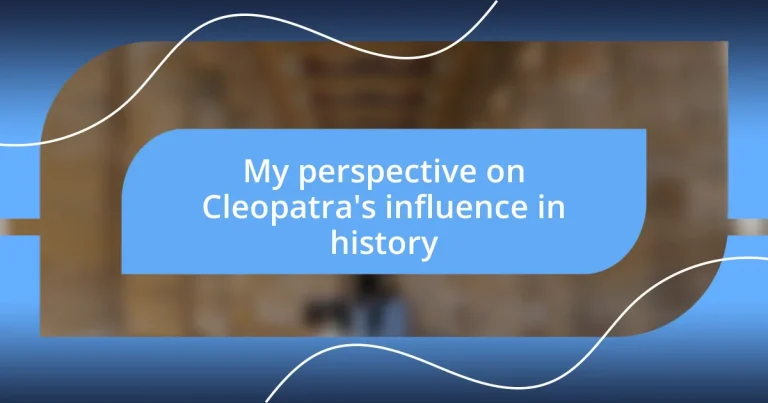Key takeaways:
- Cleopatra VII skillfully navigated a complex political landscape through strategic alliances with Roman leaders, leveraging her identity and charisma to secure Egypt’s position amidst external threats.
- Her reign has had a lasting cultural impact, inspiring artistic representations and reshaping narratives around femininity and female power in various forms of literature and media.
- Cleopatra’s legacy continues to influence contemporary discussions on female empowerment and leadership, highlighting the challenges women face in leadership roles today.
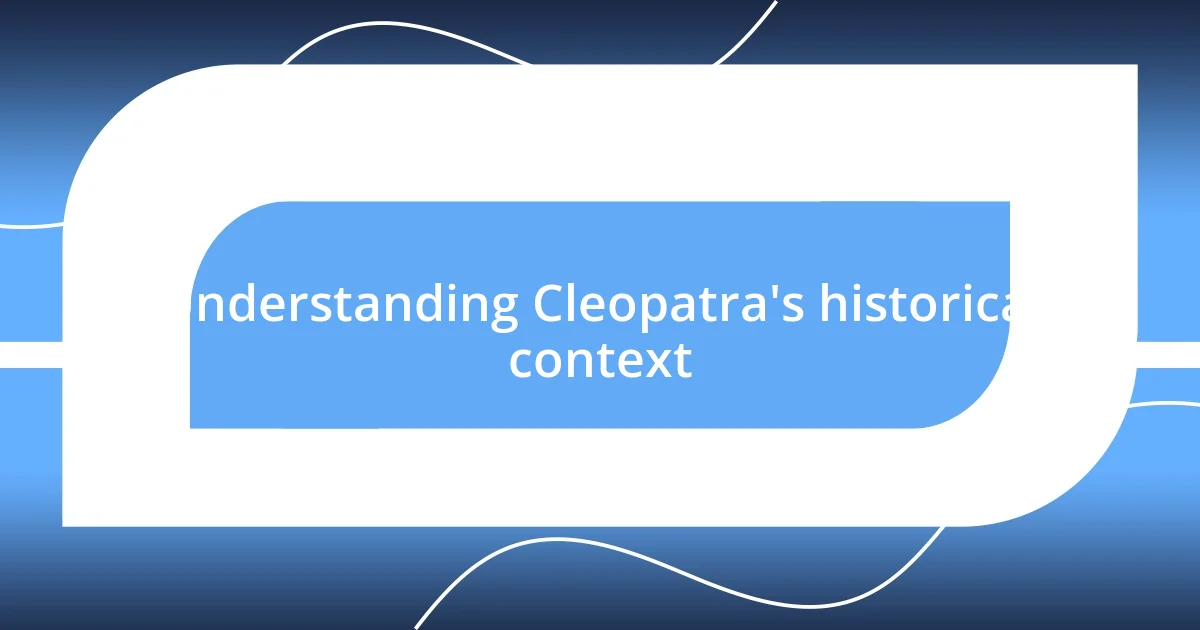
Understanding Cleopatra’s historical context
Cleopatra VII ruled during a time of great turmoil and transition in the ancient world, specifically the late Ptolemaic Kingdom of Egypt. I often find myself reflecting on how the dynamics of power shifted during her reign, with Rome’s influence rapidly expanding. Can you imagine the pressure she must have felt while navigating the political landscapes of both her kingdom and a burgeoning empire?
Her cultural context was equally rich, blending Greek, Egyptian, and Roman influences. I remember reading about how this unique mix manifested not only in her governance but also in her personal style and relationships. It’s fascinating to consider: how did her multifaceted identity shape her legacy as a ruler?
Moreover, Cleopatra’s reign coincided with significant social and political unrest. The struggles between the ruling elite and the common people must have weighed heavily on her decisions. Looking back, it makes me wonder how different her story might have been if she had more control over those external forces. Understanding this context helps me appreciate the complexity of her character and the depth of her influence in history.
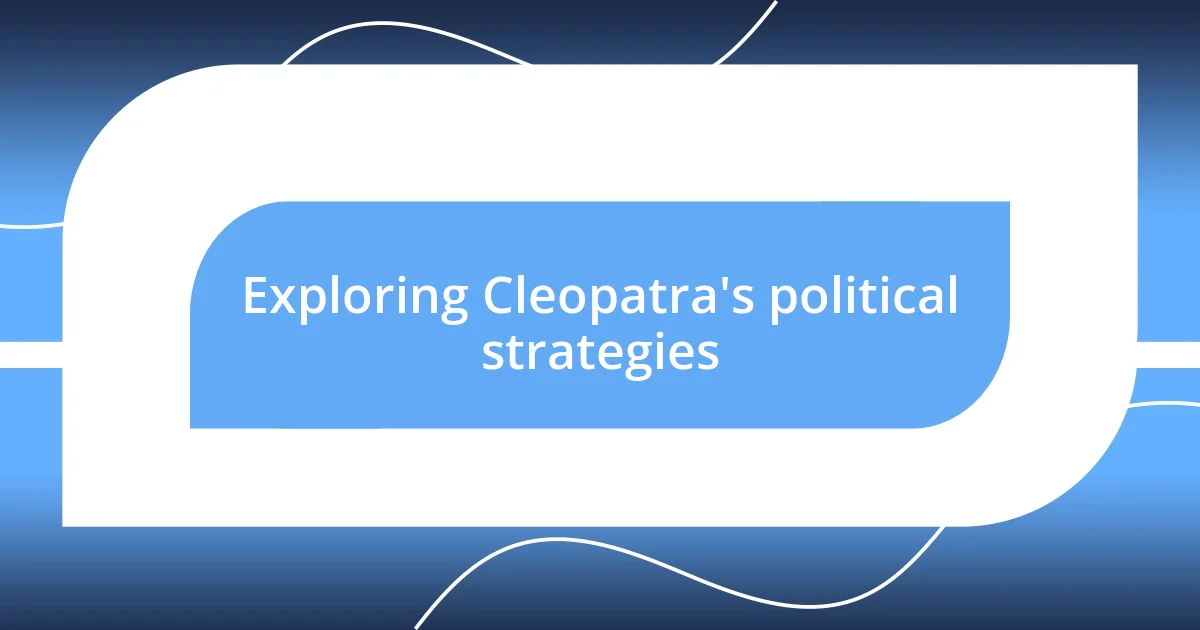
Exploring Cleopatra’s political strategies
Exploring Cleopatra’s political strategies reveals her masterful use of alliances and charisma. When I think about her relationships with powerful Roman figures like Julius Caesar and Mark Antony, it strikes me how she leveraged personal connections to secure Egypt’s position in the face of external threats. It’s almost like a high-stakes chess game; every move she made was calculated, and she used her intelligence and charm as formidable weapons.
- Strategic Alliances: She formed key partnerships with influential Roman leaders, which fortified her power.
- Cultural Appeal: Cleopatra understood the value of presenting herself as a goddess, which enhanced her image and influence.
- Economic Maneuvering: By controlling crucial trade routes, she ensured Egypt’s wealth and stability, making it a vital player in the Mediterranean.
- Public Engagement: She actively involved herself in the lives of her citizens, creating a sense of loyalty that was crucial during tumultuous times.
Reflecting on these points, I can’t help but admire the distinct ways she balanced personal desire with the political necessity of her era. It’s powerful to consider how a single ruler’s choices can shape not just a nation but also influence the course of history itself.

Analyzing Cleopatra’s cultural impact
Analyzing Cleopatra’s cultural impact is an intriguing exploration of how her reign influenced art, literature, and even modern perceptions of femininity. I often think back to a time when I stumbled upon paintings of Cleopatra in my art history class. Those vivid depictions made me realize how effectively she captured the imagination of artists across centuries. It’s as if her allure transcended time, sparking creativity that still resonates today. Can you see how her image as a powerful woman has imprinted itself on contemporary depictions of female leaders?
One aspect that really stands out to me is the way Cleopatra represented femininity and power simultaneously. During her time, it was uncommon for women to wield such influence. I remember discussing this contrast with friends; we pondered how her legacy has empowered women throughout history. She became a symbol of ambition and intellect in a male-dominated world, showcasing that women could not only participate in political arenas but perhaps even excel in them.
The fascination with Cleopatra in literature and film also illustrates her lasting impact. I often watch adaptations of her story and find myself surprised by the varying interpretations each medium brings. From Shakespeare to modern films, I see a reflection of society’s evolving views on gender and power. Each retelling keeps her narrative alive, shaping how we understand women in leadership even today. It’s a beautiful testament to her enduring legacy, isn’t it?
| Aspect | Impact |
|---|---|
| Artistic Representations | Inspired countless works through visual arts, enhancing Cleopatra’s iconic status. |
| Symbol of Female Power | Embodied the blend of femininity and authority, influencing perceptions of female leaders. |
| Literary Influence | Continues to reshape narratives around women’s roles in society through various adaptations. |

Examining Cleopatra’s relationships with leaders
When examining Cleopatra’s relationships with leaders, one can’t overlook the immense tension and passion that characterized her connection with Julius Caesar. I often think about how she wrapped herself in the aura of a goddess, positioning herself as a partner who could offer not just a personal liaison but also political stability. Imagining their first meeting, it’s almost like a scene out of a movie—two powerful figures drawn together, each seeing strategic gains. Isn’t it fascinating how love and politics can intertwine so seamlessly?
With Mark Antony, the dynamic shifted yet again. Their collaboration was marked by deep emotional ties but also by a sense of urgency to unite against shared enemies. I find myself reflecting on how their love affair had real political repercussions; it wasn’t just romantic escapism. For instance, I remember reading about the moment they met in Tarsus, where Cleopatra’s entrance was nothing short of dramatic. Picture it: Antony captivated not just by her beauty but by her cunning presence. It’s the kind of moment that makes you wonder—how did their personal passions affect a whole empire?
Lastly, Cleopatra’s relationships weren’t merely about affection; they were strategic masterclasses. Each alliance was a calculated risk that impacted Egypt’s standing in the world. I recall discussions with friends about how Cleopatra navigated this delicate balance. Was she driven solely by ambition, or did she genuinely seek partnership in leadership? While some may argue that love was secondary to her political machinations, I believe that her emotional intelligence allowed her to foster relations that ultimately secured her legacy. It’s a compelling exploration of how personal connections can shape historical events, don’t you think?
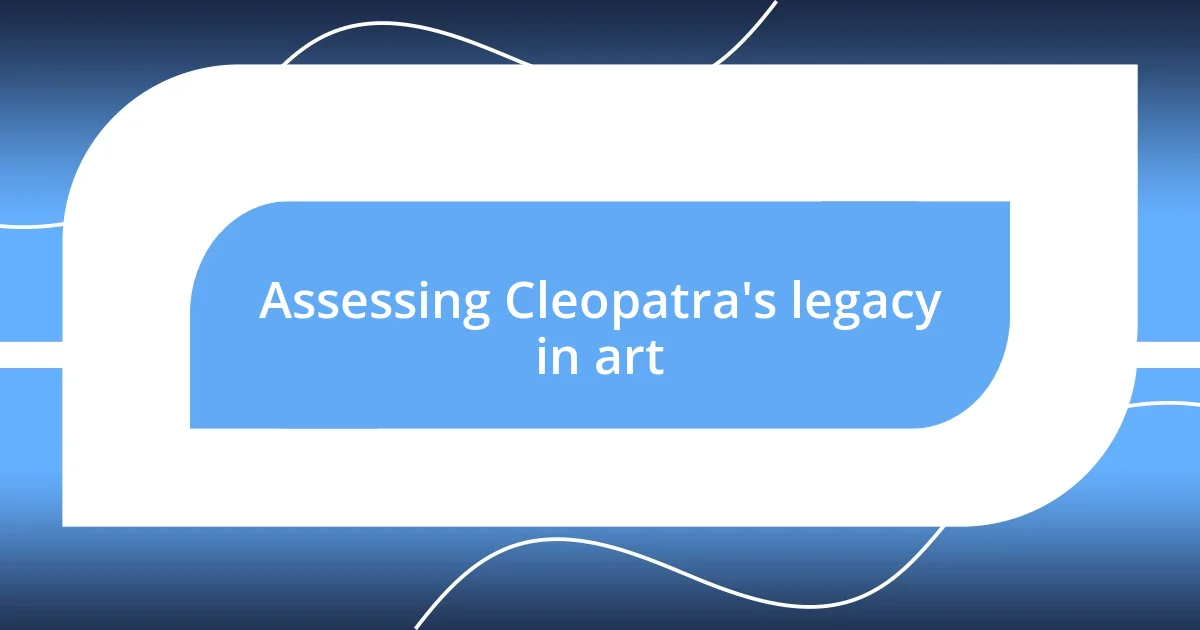
Assessing Cleopatra’s legacy in art
Assessing Cleopatra’s legacy in art reveals a plethora of interpretations that reflect her timeless influence. I remember visiting a museum exhibit where artists from different eras captured Cleopatra’s essence in diverse styles. Each artwork told its own story of her allure, from brooding portraits that emphasized her mystique to vibrant scenes that showcased her royal splendor. Isn’t it fascinating how artists portray emotions just as much as they depict her physical appearance?
One striking example is the paintings of the Baroque period, where Cleopatra is often rendered in theatrical detail. Her dramatic presence, coupled with opulent fabrics and rich colors, evoked a sense of both power and tragedy. I often feel a strong connection to these pieces, perhaps because they mirror my own understanding of the complexities women face in leadership. How can one woman embody such contradictions of strength and vulnerability? It’s a testament to her character that continues to provoke thought.
Additionally, contemporary artists still draw inspiration from Cleopatra, reimagining her narrative through modern lenses. When I first encountered a contemporary sculpture that depicted her as a fierce warrior, it broke the mold of traditional portrayals. It made me reflect on our current cultural context—how we are increasingly celebrating powerful female figures who challenge norms. Isn’t that a reflection of how Cleopatra’s legacy endures, evolving to inspire new generations? Each artistic depiction resonates with different sentiments, and they remind us that her story is not just ancient history but a living dialogue that transcends time.
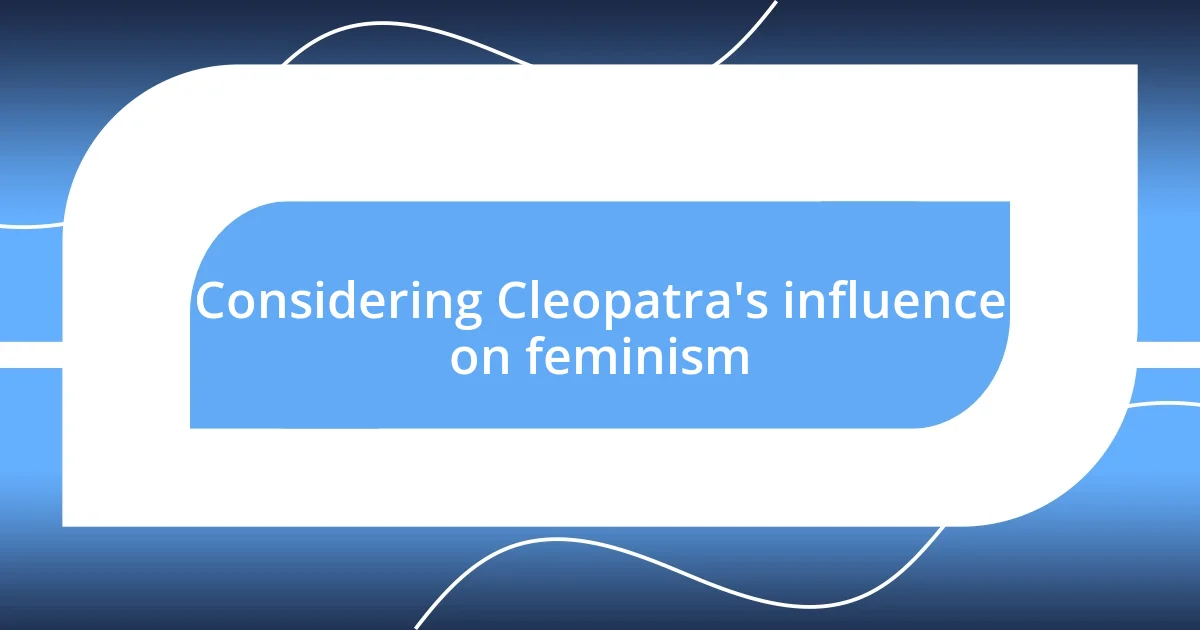
Considering Cleopatra’s influence on feminism
Cleopatra’s influence on feminism is particularly intriguing as she embodies the complexity of women’s power in a male-dominated society. I often ponder how her savvy political maneuvering challenged the notions of femininity in her time. She wasn’t just a figure of romance or beauty; rather, she wielded political clout that was unprecedented for a woman of her era. Isn’t it empowering to imagine how her intelligence and ambition reshaped perceptions of what women could achieve?
Thinking about the impact of Cleopatra, I recall reading about how feminist interpretations of her story have evolved over time. These perspectives highlight her as a symbol of female strength, challenging us to rethink the narratives surrounding powerful women. It almost brings a sense of kinship—Cleopatra’s determination resonates with the struggles women face even today. When we ask ourselves what it means to be a woman in power, I believe Cleopatra’s legacy can inspire resilience and ambition in ways that are profoundly relevant.
Her ability to maneuver through the political landscape raises a compelling question: How do we view female leadership today compared to her time? For me, it’s hard not to admire her capability to navigate complex scenarios while maintaining her agency. I reflect on modern leaders who channel that same spirit, reminding us that we are capable of charting our own paths. Cleopatra reminds us that history is not merely a record of events; it is a tapestry of voices that continue to inspire feminist discourse even in contemporary society.
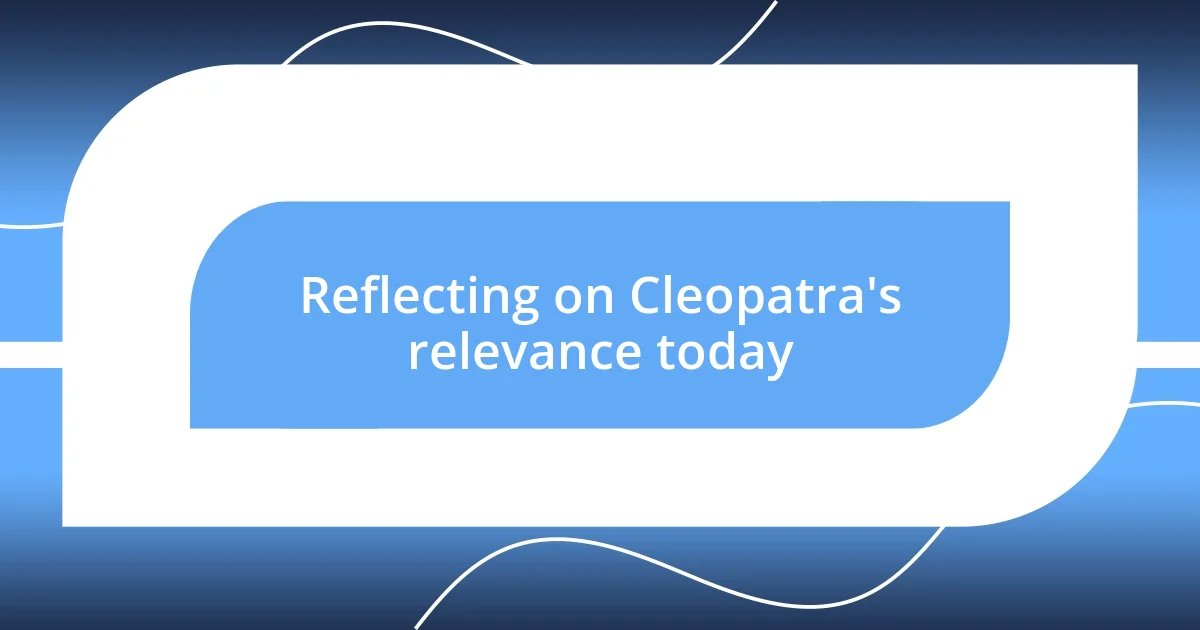
Reflecting on Cleopatra’s relevance today
Reflecting on Cleopatra’s relevance today brings to light the intricate ways she continues to inspire discussions around female empowerment and leadership. When I think about the struggles many women face in politics now, it’s almost jarring to realize that Cleopatra navigated those treacherous waters thousands of years ago. Doesn’t that make you wonder how much of her story still speaks to modern women fighting for their place at the table?
Cleopatra’s multifaceted identity as a ruler and a woman forces us to question our contemporary standards of femininity and power. I often find myself resonating with themes of resilience in her story. For example, during a recent conversation with friends about women in leadership, we discussed how society still grapples with the dual expectations placed on women. Isn’t it curious that we still wrestle with the balance between grace and authority, much like Cleopatra did in her reign?
Moreover, I believe Cleopatra’s influence is a reminder to celebrate our complexities. I remember a time when I faced criticism for being too assertive in a group setting. It made me reflect on Cleopatra’s own challenges—how she was often viewed through a lens of stereotypes, despite her incredible intellect. The way she embraced her complexity speaks volumes to us today. Isn’t it empowering to think that by owning our narratives, we can create ripples of change inspired by her enduring legacy?












